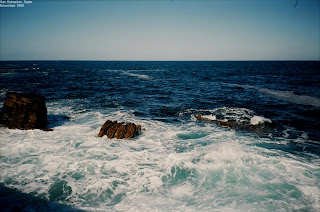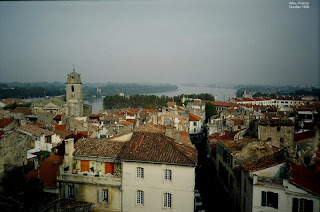 |
| Un buen día en San Sebastian |
From Barcelona, I took the night train north. It was absolutely packed. Spaniards of all shapes and sizes were going home after El Día de los Muertes: including the shepherd with the tall walking stick, the dapper older gentleman with wife and daughter; modest Catholics all. I had entertained hopes of stretching out and sleeping on the ride up. False! Each seat was occupied. In the seat across from me was Australian Jay (down-to-earth surfer dude).
Jay and I, both veteran travelers, conversed on the ride since sleep was unattainable. We struck up an immediate friendship in that way that travelers have. When the train stopped at San Sebastian we debarked, assuming, without ever having discussed it, that we would room together while we were there. We were approached by a matronly Basque doña before we even left the platform. Un dormitorio, nos dijo. We followed her to the pensione.
 |
| Hace mucha lluvia |
San Sebastian is in Basque country. The town had fallen in 1808 to Napoleon's Grande Armée forces.
But Nappy, the diminutive Corsican, would learn all too well how fiercely those denizens of Iberia guard their liberty. Guerrilla actions, partisan activities bled l’Armée, as it lumbered around rugged Spanish terrain. The Spaniards sapped French strength, leaving them spent and demoralized when Russians, Austrians, English, and Germans brought the tyrant to bay in Paris.
Later, in 1935, Franco's Nationalists imposed the fascist jackboot on San Sebastian in the Spanish Civil War. Resentments still simmer.
 |
| Jay (down-to-earth surfer dude) and a beautiful Basque girl |
We found an Irish pub in town where we met Australians Jody and Troy, in Spain on their honeymoon. We swilled Guinness stout, with its silky, animated head. The evening was spent gulping Irish ale in Spain with Australians, listening to stories about sharks in Australia, recounting past loves, proclaiming hopes for the future. Van Morrison played on the stereo.
 |
| Honeymooners Jody and Troy |
"Van is the Man," Jay agreed. "He's never let me down."
We ended the evening very drunk.
Next day, the weather was beautiful: sunny and cool, blue skies, blue water. Jay and I climbed to the top of the hill that overlooks the bay, where sits the old Cathedral. In the courtyard was a wishing well. A crone crouched at the top, raising coin-filled buckets from below, where her son gathered the castaway hopes of passing tourists.
 |
| Jay and I clowning around at the water's edge |
 |
| Las aguas de la Bahía de Vizcay |
The next morning I left for France. Jay stayed in San Sebastian another day. Onward. Jay, I hope you found it, whatever it was.
To be continued...
- Pt. I Amsterdam - Arnhem - Copenhagen
- Pt. II Copenhagen - Oslo
- Pt. III Bergen
- Pt. IV Flam fjord - Goteborg
- Pt. V Stockholm - Gavle - Stockholm
- Pt. VI Berlin
- Pt. VII Prague
- Pt. VIII Budapest
- Pt. IX Vienna
- Pt. X Munich
- Pt. XI Salzberg - Innsbruck
- Pt. XII Venice - Florence
- Pt. XIII Siena
- Pt. XIV Rome
- Pt. XV Naples - Pompeii
- Pt. XVI Cinque Terre - Geneva
- Pt. XVII Avignon
- Pt. XVIII Arles
- Pt. XIX Barcelona
- Pt. XX San Sebastian
- Pt. XXI Bordeaux - St. Lo
- Pt. XXII Paris
- Pt. XXIII Brussels - Waterloo
- Pt. XXIV Brugge
- Pt. XXV Amsterdam at last






































